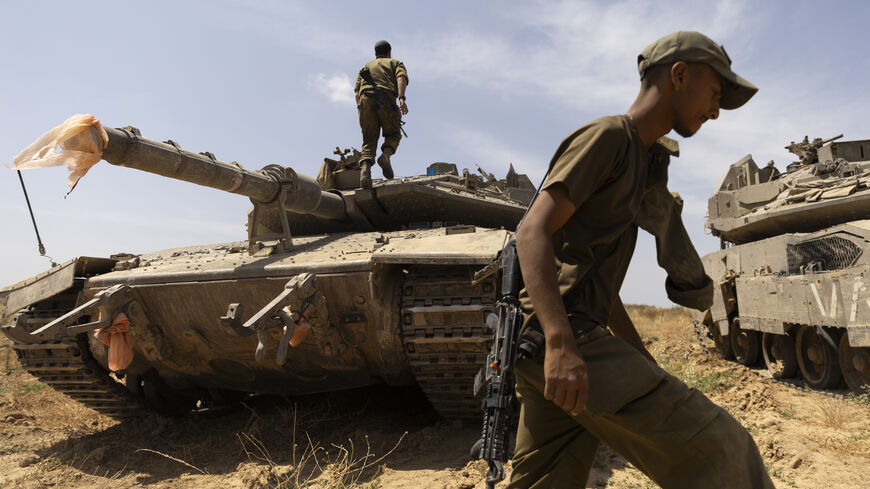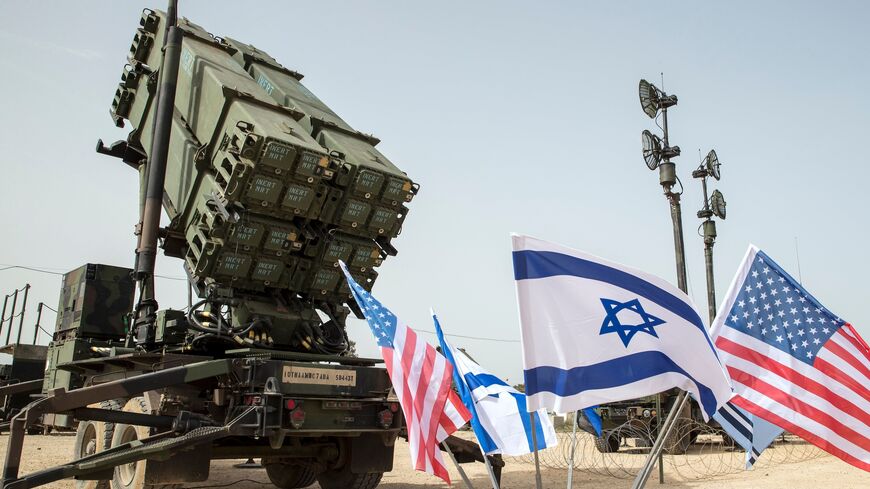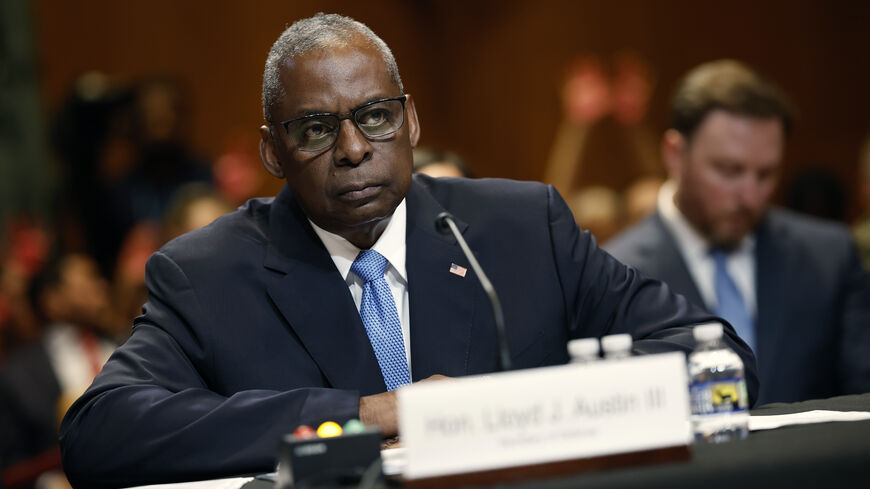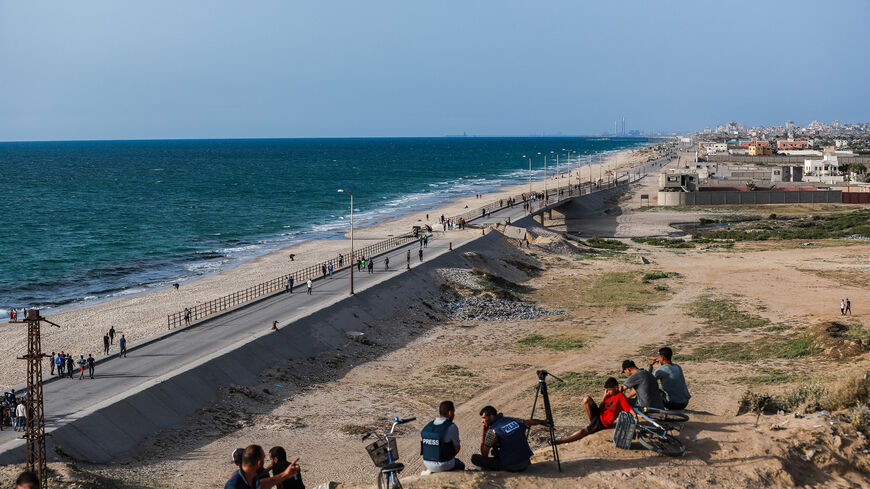Biden pauses transfer of bombs to Israel amid concerns of Rafah invasion
It's the first time the Biden administration has admitted restricting the flow of arms to Israel in a bid to shape the ongoing war in Gaza, but the move failed to stop a limited initial incursion into Rafah.

WASHINGTON — The Biden administration paused a planned single shipment to Israel of air-to-ground munitions last week over concerns that Israeli leaders were nearing a decision to launch a military incursion into Rafah without adequate preparations to protect civilians, a senior Biden administration official told Al-Monitor.
The decision to pause the shipment, which contains 1,800 2,000-pound bombs and 1,700 500-pound bombs, marks the first known instance of the Biden administration leveraging the flow of US weaponry to Israel in an attempt to shape its war campaign in Gaza, now in its seventh month.
The move came just days before Israeli leaders launched what appeared to be the opening moves of an incursion into Rafah on Monday, signaling defiance in the face of pressure from Washington and its allies.
US officials have not issued a final decision on the shipment of the air-to-ground bombs, according to the senior administration official. The Biden administration has also placed other planned arms shipments, including Joint Direct Attack Munition guidance kits, under review, though none of those transfers are imminent, the official said.
Why it matters: Biden administration officials have been pressing Israeli leaders not to launch a major ground invasion of Rafah without first facilitating the safe evacuation of some 1.4 million civilians who have sought shelter there.
Israeli Prime Minister Benjamin Netanyahu ordered the military to draw up plans to evacuate Rafah's civilian population in early February, but Pentagon and White House officials said that as of Tuesday, they have not seen a realistic Israeli plan.
"Those discussions are ongoing and have not fully addressed our concerns," the senior administration official said.
At some point last month, as it became clear Israeli leaders were approaching a decision to launch an operation despite having not made adequate preparations for civilians, administration officials began reviewing planned shipments of American-made weapons that Israel's military might use in Rafah, according to the official.
The United States has provided the vast majority of munitions Israel has dropped on Gaza since the Oct. 7 Hamas attacks. Analysts have described the Israeli bombing campaign as among the most intensive undertaken in the 21st century. Some 34,700 Palestinians have been killed in the war, the majority of them women and children, according to the Hamas-run Gaza health ministry.
US officials are especially concerned about Israel's potential use of 2,000-lb. bombs and "the impact they could have in dense urban settings as we have seen in other parts of Gaza," the senior political source told Al-Monitor.
Yes, but: The delayed arms shipment failed to prevent what appeared to be at least a limited Israeli ground incursion into Rafah on Monday.
An armored brigade seized the Gaza side of the Rafah border crossing with Egypt overnight as the 84th Givati Infantry Brigade pushed northeast toward the Salah ad-Din road, the Israeli military said.
Earlier on Monday, Netanyahu's office declared his wartime cabinet had decided unanimously to press ahead with "the operation in Rafah to exert military pressure on Hamas in order to advance the release of our hostages and the other goals of the war."
Egypt condemned the move amid fears that an Israeli operation in Rafah could push large numbers of Palestinians over the border into the Sinai Peninsula. The decision by Netanyahu's war cabinet came just a few hours after Biden had urged the Israeli leader in a phone call not to move forward with a ground invasion.
Shortly following the call between the two leaders on Monday, Hamas announced it had accepted a cease-fire proposal put forth by Egypt and Qatar in the absence of Israeli negotiators in Cairo over the weekend. Hamas' response was more of a counter-proposal than an acceptance, catching Netanyahu's government off guard, but US officials saw it as a potential foot in the door.
"A close assessment of the two sides' positions suggests that they should be able to close the remaining gaps, and we're going to do everything we can to support that process and that outcome," White House National Security Council spokesperson John Kirby told reporters on Tuesday.
The Israeli military incursion appeared to slow as Israel sent a delegation to Cairo to join CIA director Bill Burns as well as Qatari and Egyptian officials on Tuesday for eleventh-hour negotiations over a cease-fire proposal that would see Hamas release 33 Israeli hostages in exchange for a 42-day pause in fighting.
US officials are hoping Israel's leaders will hold off on plans to invade Rafah.
"We don't want to see any operation conducted in Rafah that doesn't properly account for the safety and security of the people that are there, big or small," Kirby said Tuesday. "We're going to be watching this one very, very closely."
Know more: In an apparent effort to retain leverage over Israeli decision-making, the Biden administration skirted a Wednesday deadline for the State Department to report to Congress on whether Israel is using US weapons to violate international law in Gaza. The ruling on Biden's National Security Memorandum-20, or NSM-20, has been postponed indefinitely, Politico initially reported.
"We've been very consistent about our concerns of a major ground operation in Gaza that would put at great risk the refugees that are still there. And nothing's changed about that," Kirby said Tuesday. "The Israelis have told us … that that's not what this is. That this is an operation of limited scope, scale and duration and aimed at cutting off Hamas' ability to ship arms across the Rafah border," he said.
The Israeli military's push into Rafah on Monday has halted the movement of humanitarian aid at two key crossings into the southern Gaza Strip, UN officials said on Tuesday, just days after the UN World Food Programme's director said northern Gaza was experiencing a "full-blown" famine.
White House officials on Wednesday said Israeli officials had informed them that the Kerem Shalom crossing would reopen as early as Wednesday.
"We do want to see more aid be able to get through these crossings. That is a commitment that the Israeli government has made, that they will," Pentagon deputy press secretary Sabrina Singh told reporters on Tuesday.
On Tuesday, the US military finished constructing a temporary floating pier system expected to offload some 150 trucks of aid per day directly into Gaza once fully up and running, but the project has been held up at the Israeli port of Ashdod. Pentagon officials are blaming high sea swells for the delay.






